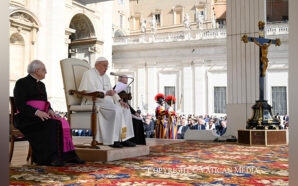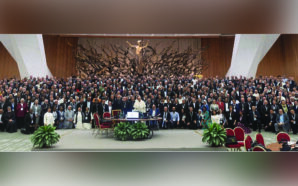An award-winning Czech Catholic priest and intellectual has warned Europeans to be wary of populist politicians who are using Christianity to push their nationalist agendas, saying this is the greatest threat to the European Union.
“We are once again witnessing how God is being confused with the nation and the Christian faith with the dangerous idolatry of xenophobia and populism,” said Monsignor Tomas Halik, the 2014 winner of the Templeton Prize for advances in religion and spirituality.
He made the remarks in a keynote address on the challenges facing Christianity in Central Europe. Halik, who teaches philosophy and theology at the Charles University in Prague, spoke at the Austrian shrine of Mariazell on the occasion of a “European Pilgrimage” organized by the Ackermann Community.
So-called Christians who have never read Gospel
“Many impassioned speeches about the need to protect Christian values in Europe, particularly in connection with fear of migrants and Muslims, are only empty words, speech bubbles intended to veil populists’ claim to power as they attempt to replace parliamentary democracy with autocratic systems,” the 70-year-old priest-intellectual said.
He gave his talk as citizens of the European Union’s 28 member states were preparing to go to the polls from May 23-26 to elect representatives to the European Parliament.
Halik noted that certain politicians were calling for a return to a “Christian Europe” and to “Christian values” in light of the increasing numbers of Muslims in Europe. But he said such calls were particularly suspect when they came from nationalist and populist politicians in the post-communist world who had hardly ever read the New Testament. He said this was particularly obvious in Poland and Hungary.
“When I saw hordes of supporters of Poland’s ruling Law and Justice Party in Warsaw marching through the streets flourishing banners inscribed with the words ‘We want God’ while at the same time shouting anti-Semitic slogans, I inevitably asked myself what sort of God these people want. It’s certainly not the God that Jesus of Nazareth calls Father,” Halik said.
Crisis within Catholic Church
Halik, who was a religious and cultural dissident during the Soviet-dominated communist era, also addressed the crisis within the Catholic Church. He pointed out that facts that had long been kept quiet are now coming to light, such as the clerical sex abuse of minors and nuns, priests secretly fathering children and the alleged homosexual lobby in the uppermost echelons of the hierarchy.
He said it was more than understandable that revelations of such things had shattered the Church’s credibility, not only in secular society but also among Catholics.
Halik noted that Pope Francis has diagnosed the cause of clerical sexual abuse as an abuse of power, authority and trust, which he had summed up as clericalism.
The Czech priest said the pope’s diagnosis was the same as Jesus’ criticism of the Pharisees for imposing burdens of the law and prohibitions on others while they themselves did not observe.
Ending clericalism
Halik pointed out that bishops attending the Second Vatican Council (1962-65) had called for an end to clericalism. He noted that this was explicitly made though the Pact of the Catacombs, an agreement 42 bishops signed three weeks before the end of the council, to which 500 more prelates added their names in the following months.
“The fact that this revolution in the Church remains unfinished implies that clericalism cannot be overcome by reforming church structures. A change of mindset — a ‘metanoia’ — is called for,” Halik said.
“True reform presupposes a spiritual revolution. It means eliminating the structures of clericalism, that ‘pharisaical leaven’ in the consciousness of the faithful, both of the clergy and of the laity,” he insisted.
“The way in which we understand and experience the Church must go back to the core of the Gospel Message.”
No going backwards
“The huge ship of yesteryear’s traditional Christianity is sinking and we should not waste time pushing the deckchairs on the Titanic from one side of the deck to the other,” Halik warned.
He said those who believe the clerical sexual abuse crisis will eventually pass and all will be well again are deluding themselves.
Halik argued that the true meaning of Jesus’ Resurrection must be pondered more seriously if Christianity is to avoid becoming a “closed sect” in the future. He noted that the disciples had not recognized Jesus on the way to Emmaus, Mary Magdalene had mistaken him for the gardener and Thomas the Apostle had demanded proof of his wounds.
Thus, it is imperative today not to look back to the past nostalgically but to look for Christ in those who are wounded.
Halik concluded that the most important thing one can do for the renewal of Christianity today is to create platforms for dialogue, study and reflection. He said it is there where the “signs of the times” can be sought and answers for them can be found.
By Christa Pongratz-Lippitt , reproduced with the permission of La Croix International.








